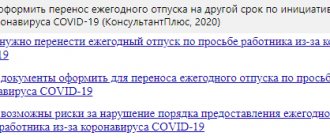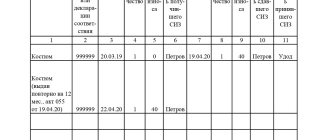New edition of Art. 124 Labor Code of the Russian Federation
Annual paid leave must be extended or postponed to another period determined by the employer taking into account the wishes of the employee in the following cases:
temporary disability of the employee;
the employee performs state duties during his annual paid leave, if the labor legislation provides for exemption from work for this purpose;
in other cases provided for by labor legislation and local regulations.
If the employee was not paid in a timely manner for the period of annual paid leave or the employee was warned about the start time of this leave later than two weeks before its start, then the employer, upon the written application of the employee, is obliged to postpone the annual paid leave to another date agreed with the employee.
In exceptional cases, when the provision of leave to an employee in the current working year may adversely affect the normal course of work of an organization or individual entrepreneur, it is allowed, with the consent of the employee, to transfer the leave to the next working year. In this case, the leave must be used no later than 12 months after the end of the working year for which it is granted.
It is prohibited to fail to provide annual paid leave for two years in a row, as well as to not provide annual paid leave to employees under the age of eighteen and employees engaged in work with harmful and (or) dangerous working conditions.
Article 124 of the Labor Code of the Russian Federation
Every person should have a good rest after a year of continuous work. The right to paid leave arises after 6 months. If the company employs a large number of employees, the schedule is drawn up in advance at the beginning of the year. In this case, the opinion of the employee himself is taken into account, and if necessary, a transfer is made to another time of the year.
This point is regulated by Art. 124 of the Labor Code of the Russian Federation, clearly indicating which reasons should be considered valid for the correction of already agreed upon vacation schedules. It also establishes categories of persons for whom transferring the statutory holiday to the next year is impossible. These are minor citizens and employees in hazardous industries. In other cases, the employee may be refused to adjust the drawn up plan for the following reasons:
- The application was received later than 2 weeks before the start of the vacation.
- The employee received the payments and compensation due to him.
- There is no valid reason for the postponement.
Attention! Changing vacation dates usually occurs on the initiative of the employee himself, so it is important to submit an application on time, in which you justify your request. If the reason is provided for in Part 1 of Art. 124 of the Labor Code of the Russian Federation, the employer does not have the right to refuse him.
When is an employer required to reschedule vacation?
An employer's mistake can also cause a change in the timing of annual rest. According to Article 124 of the Labor Code of the Russian Federation, failure by an enterprise to comply with the legally defined deadlines for informing and paying vacation pay may be grounds for filing an application to change vacation dates.
Late notification of the start of vacation
After approval of the vacation schedule, the employer retains the obligation to issue a corresponding order in advance (2 weeks before the first vacation day) and familiarize the citizen with it against signature on the familiarization sheet or on the order itself. The notification period is regulated by Article 123 of the Labor Code of the Russian Federation.
Late payment of vacation pay
Failure by the organization to comply with the norms of Article 136 of the Labor Code may also cause the employee to submit an application to change the vacation period. The law requires vacation pay to be paid 3 days before the vacation or earlier. When paying by bank transfer, non-working days should be taken into account. The amount must arrive in the recipient's account within the specified period.
Violation of Labor Code norms by the employer makes it possible to request a postponement of vacation. The deadline must suit both parties. Canceling part of the vacation requires a change to the annual schedule. According to comments from Rostrud, the postponement can be made based on agreement of the parties, which does not eliminate the need to adjust the schedule after a decision is made on new dates.
Note! If there is a delay in transferring vacation benefits, the enterprise is obliged, according to Article 236 of the Labor Code, to pay compensation to the citizen. The rate cannot be lower than 1/150 of the refinancing rate of the Central Bank of the Russian Federation for each day of delay.
Extension or transfer of annual paid leave
Changing or extending vacations is sometimes carried out at the initiative of the employer. This is often required when an enterprise is reorganized or new technologies and work systems are introduced into production. Then the company informs all personnel about the adjustments made. Rescheduling or changing vacation dates at the employee’s initiative is carried out, in accordance with Article 124 of the Labor Code of the Russian Federation, subject to the following conditions:
- The employee fell ill and sought help from a medical facility. Sick leave is confirmed by opening a certificate of incapacity for work.
- The employee was entrusted with the performance of important duties of national importance, which, according to labor legislation, are grounds for release from work (members of the election commission, military training, etc.).
- The employee did not receive the compensation due to him on time or the employer violated the rules of warning the person about the vacation time, but the citizen is required to submit a written application about the need to change the vacation dates.
- Going on vacation will lead to disruptions in the organization’s work and may negatively affect the activities of an individual enterprise.
Article 124 of the Labor Code of the Russian Federation also directly states that the extension of leave is carried out for the number of days during which the circumstances that served as the basis for the extension or transfer to another period existed.
The salary amount remains unchanged. If a citizen is involved as a member of the election commission, then he receives compensation for his work based on adopted regional regulations. The government agency that sends the invitation is obligated to pay it. If we consider Article 124 of the Labor Code of the Russian Federation with comments, then the conditions are clearly stated there, but the possibility of transfer is also not reflected if the annual leave falls during the session period. In this case, the employee has the legal right to rest at other times at his own discretion, subject to agreement on the dates with the employer.
Conditions for transferring vacation from the current year to the next
The provisions of the Labor Code of the Russian Federation also contain an indication of exceptional cases when, at the initiative of an employee or production necessity, annual paid leave is postponed to the next year. It must be used no later than 12 months after the end of the working period for which it was provided. Transfers are prohibited in the following cases:
- The employee did not take vacation for two years in a row, regardless of the reasons.
- The employee is not yet 18 years old.
- Hazardous production or harmful working conditions.
It is important to know! These categories receive a stipulated rest period every year. The law establishes a special procedure for persons working in the Far North or areas that have been equated to them. They can also combine holidays over two years, subject to any additional periods due.
Cases of extending or postponing vacation
Article 124 of the Russian Labor Code defines cases when an organization must increase the duration or shift part of its employee’s vacation to another period:
- Increasing the duration during illness or postponing leave due to incapacity for work is required if sick leave is available.
- Citizens who performed duties assigned by the state can count on a change in the terms of the vacation period.
- An enterprise may establish other conditions in local regulations for changing vacation time.
When changing deadlines, the law requires taking into account the wishes of the citizen whose vacation period is being adjusted.
Temporary disability of an employee
If the illness occurred after the order was issued for the enterprise and the citizen did not have time to recover, leave during sick leave for temporary disability is not granted. It will begin to flow only after the “closure” of the sick leave.
A person who falls ill while on vacation can notify the employer of his illness in a convenient way.
To subsequently change the vacation period, the following is required:
- contacting a medical institution and receiving a sick leave certificate that does not contain errors;
- adjustment of the timesheet by the HR department or accounting department of the enterprise in order to correctly reflect the reasons for the employee’s absence.
Automatic extension is based on a normative document from the times of the USSR - “Rules on regular and additional holidays”, adopted by the People’s Commissariat of Labor in 1930. According to the document, which is valid in the part that does not conflict with the Labor Code, vacation is extended for the duration of illness automatically, without filing applications or recalculating. If during the illness there is a public holiday that is a non-working day, this day is not taken into account.
Important! A non-working holiday falling on vacation is not counted in the total number of vacation days. When extending vacation time, this day is also not added.
If a citizen decides not to continue his vacation after the previously agreed date, it is necessary to agree on the transfer of the balance with the company. Vacation days will be recalculated and payments made will be adjusted. Days unused due to illness can only be transferred within the next year. As a rule, the working year differs from the calendar year.
Special cases of incapacity during vacation
The situations described in Part 1 of Article 124 of the Labor Code should not be confused with similar events that do not fall under its scope. In two cases, the vacationer will not be given sick leave:
- You cannot receive sick leave to care for a sick child or other relative (See Letter from Rostrud dated 06/01/12 on extending leave for temporary disability of family members).
- Even if a medical institution issues sick leave in the event of temporary disability during a vacation without pay, the employer must not pay sickness benefits.
It is not possible to extend pre-dismissal and educational leave for the duration of illness.
If an employee falls ill outside of their region of residence, this does not exempt them from the need to obtain a certificate of incapacity for work. Based on the territory in which this happened, you can get sick leave as follows:
- On the territory of another subject of the Russian Federation, sick leave is issued at a local medical institution. Such a document will be accepted.
- A certificate issued by a hospital or clinic in a CIS country must be officially translated into Russian and certified by a notary. The certificate must be taken to the Russian clinic to which the patient is assigned in order to issue a Russian sick leave certificate.
- A document on a disease issued by other states may require certification at the Russian consulate with subsequent apostille. You can clarify the conditions for obtaining and the necessary requirements from the insurance company.
Important! Legalization of a medical certificate issued abroad may require additional time and financial costs.
If an employee provides supporting documents with a delay due to the fact that he was in another region or abroad, the situation cannot be considered as an abuse of the right to increase the duration of leave (see Review of court practice, approved by the Presidium of the RF Armed Forces on February 5, 2014).
Execution of government duties
Article 170 of the Labor Code establishes the employer’s obligation to provide an opportunity for an employee to perform state or public work of a certain type. If a citizen is involved in performing such tasks during vacation, he has the right to expect an extension or change in rest time.
Tasks the completion of which is compensated:
- summons for questioning at a court hearing or at institutions conducting an investigation, as a witness, victim or in another procedural capacity;
- performing the role of a juror on the basis of the provisions of the Russian Law of August 20, 2004 No. 113-FZ “On Jurors”;
- acting as a witness, professional expert or translator at a court hearing;
- conscription for army training or medical examination at the military registration and enlistment office.
A summons or certificate from a government agency is attached as a supporting document.
Other reasons for transfer
The Code allows the transfer of annual leave in situations provided for by internal regulations or other federal laws. Changing the rest periods of the organization’s employees is possible:
- coincidence of annual leave with educational leave;
- birth of a child;
- death of loved ones;
- wedding.
The company may provide in its internal regulations for more lenient conditions regarding the transfer of vacation at its own expense or in case of illness of children.
Another comment on Art. 124 Labor Code of the Russian Federation
1. Article 124 of the Labor Code of the Russian Federation establishes the conditions:
a) extension or postponement of annual paid leave in cases of temporary incapacity for work of an employee, performance of government duties during leave and in other cases (Part 1 of Article 124 of the Labor Code of the Russian Federation);
b) transfer of annual paid leave to another period due to the employer’s violation of the rules for warning the employee about the start time of the leave or payment for the leave period (Part 2 of Article 124 of the Labor Code of the Russian Federation);
c) transfer of annual paid leave to the next working year, if the provision of leave in the current year may adversely affect the normal course of work of an organization or individual entrepreneur (parts 3, 4 of Article 124 of the Labor Code of the Russian Federation).
2. In the cases specified in Part 1 of Art. 124 of the Labor Code, annual paid leave is extended by the number of calendar days during which the circumstances that served as the basis for the extension existed, or is postponed to another period. When the vacation is extended, the amount of wages paid to the employee during the vacation does not change, and payment for days of temporary incapacity for work and performance of state duties is made in accordance with the law (benefits are paid for the period of temporary incapacity for work - see Article 183 of the Labor Code of the Russian Federation and the commentary thereto ; during the performance of state duties, the state body that engaged the employee to perform state duties pays him compensation in the amount determined by law - see Part 2 of Article 170 of the Labor Code of the Russian Federation and the commentary thereto).
When transferring vacation in these cases to another period, the time for which the vacation is postponed is determined by the employer, taking into account the wishes of the employee.
If the circumstances provided for in Part 1 of Art. 124 of the Labor Code, did not occur during the vacation period, but immediately before the employee went on vacation according to the schedule; the vacation must also be postponed to another date during the current working year. Transferring vacation to another period is also possible if the scheduled annual vacation coincides with educational leave. There is no direct indication in labor legislation on this matter, but many years of practice consistently adheres to this rule.
3. Violation by the employer of the vacation payment deadline (vacation payment is made no later than three days before its start - see Article 136 of the Labor Code of the Russian Federation and the commentary thereto) or warning the employee about the start time of the vacation later than two weeks before its start shall serve as grounds to transfer the vacation to another period, and this period must be agreed upon between the employee and the employer.
Postponement of vacation in cases where payment was not made on time or the employee was notified of the start time of vacation later than two weeks in advance assumes that a vacation time is set other than that provided for in the vacation schedule. Although the vacation schedule is approved by the employer taking into account the opinion of the elected body of the primary trade union organization, the transfer of vacation is carried out by agreement of the parties without the participation of the trade union body.
4. The law does not disclose the concept of exceptional cases that allow the employer, with the consent of the employee, to postpone vacation to the next working year. Part 3 Art. 124 of the Labor Code of the Russian Federation contains only a general criterion that the employer must follow: granting an employee leave in the current working year may adversely affect the normal course of work. When obtaining the employee’s consent to postpone the vacation, the employer cannot be limited to this general criterion, but must indicate specific exceptional circumstances that could lead to a disruption in the normal functioning of the organization or individual entrepreneur.
5. An important guarantee of the right to rest is the norm of Part 4 of Art. 124 of the Labor Code of the Russian Federation on the prohibition of non-provision of annual paid leave to employees under the age of 18 and employees engaged in work with harmful and (or) dangerous working conditions. In any case, these categories of workers must be granted annual leave. For all other employees, the rule prohibits non-provision of vacation for two consecutive years.
6. A special procedure is provided for employees working in harsh climatic conditions. For persons working in the Far North and equivalent areas, a full or partial combination of vacations is allowed, but not more than two years in advance. In this case, the total duration of the leave provided should not exceed six months, including the time of unpaid leave necessary for travel to the place of use of the leave and back. Since the total duration of combined vacations can be more than six months, the unused part of the vacation exceeding six months is added to the next annual paid vacation for the next year (see Article 322 of the Labor Code of the Russian Federation and the commentary thereto).
- ‹
Article 123 of the Labor Code of the Russian Federation. The order of granting annual paid leave - Up
- Article 125 of the Labor Code of the Russian Federation. Dividing annual paid leave into parts. Review from vacation ›
See also Rules on regular and additional leaves, approved by the People's Commissariat of Labor of the USSR on April 30, 1930 N 169
Upon written request from the employee, unused vacations may be granted to him with subsequent dismissal (except for cases of dismissal for guilty actions). In this case, the day of dismissal is considered the last day of vacation.
According to the legal position of the Constitutional Court of the Russian Federation, formulated in Resolution No. 131-O-O of January 25, 2007, the employer, in order to properly fulfill the obligation enshrined in the Labor Code of the Russian Federation (in particular, its articles 84.1. 136 and 140) to formalize dismissal and pay with the dismissed employee, must proceed from the fact that the employee’s last day of work is not the day of his dismissal (the last day of vacation), but the day preceding the first day of vacation
Upon dismissal due to the expiration of the employment contract, leave with subsequent dismissal may be granted even when the vacation time completely or partially extends beyond the term of this contract. In this case, the day of dismissal is also considered the last day of vacation.
When granting leave with subsequent dismissal upon termination of the employment contract at the initiative of the employee, this employee has the right to withdraw his resignation letter before the start date of the leave, unless another employee is invited to take his place by transfer.
Question
For an officially registered employee of a Moscow private security company who has 3 years of work experience in the company, the employment contract establishes the following work schedule: 15 days every 15 (rotation work). Does this employee have the right to receive paid leave (or monetary compensation in case of non-use)?
Lawyer's response:
According to Art. 122 of the Labor Code of the Russian Federation, paid vacations must be provided to employees annually, while in the first year of work such a right arises after 6 months from the date of hiring, in subsequent years - on the basis of the schedule in force at the enterprise. Based on Art. 115 of the Labor Code of the Russian Federation, the duration of such leave is 28 calendar days. According to clause 7.1 of the Basic Provisions governing the rotational method of organizing work (approved by Decree of the USSR State Committee for Labor No. 794/33-82 of December 31, 1987), the employer’s responsibility is to provide annual paid leave to employees engaged in work of a rotational nature only after using the inter-shift period recreation. Concurrence of these rest periods is not allowed.











